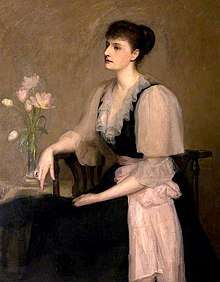Violet Jacob
Violet Jacob (1 September 1863 – 9 September 1946) was a Scottish writer, now known especially for her historical novel Flemington and for her poetry, mainly in Scots. She was described by the Scottish poet Hugh MacDiarmid as "the most considerable of contemporary vernacular poets".
Violet Jacob | |
|---|---|
 Violet Jacob, by Henry Harris Brown (1864–1948) | |
| Born | Violet Augusta Mary Frederica Kennedy-Erskine 1 September 1863 House of Dun, near Montrose in Angus |
| Died | 9 September 1946 Marywell House, near Kirriemuir |
| Resting place | Dun kirk graveyard |
| Nationality | Scottish |
| Known for | Poetry in Scots |
| Spouse(s) | Arthur Otway Jacob (m. 1894–1936) |
| Children | 1 |
Early life
She was born Violet Augusta Mary Frederica Kennedy-Erskine, at the House of Dun,[1] the daughter of William Henry Kennedy-Erskine (1 July 1828 – 15 September 1870) of Dun, Forfarshire, a Captain in the 17th Lancers and Catherine Jones (died 13 February 1914), the only daughter of William Jones of Henllys, Carmarthenshire. Her father was the son of John Kennedy-Erskine (1802–1831) of Dun and Augusta FitzClarence (1803–1865), the illegitimate daughter of King William IV and Dorothy Jordan. She was a great-granddaughter of Archibald Kennedy, 1st Marquess of Ailsa.
The area of Montrose where her family seat of Dun was situated was the setting for much of her fiction. She married, at St John's Episcopal Church, Princes Street, Edinburgh, on 27 October 1894, Arthur Otway Jacob (1867–1936),[1] an Irish major in the British Army, and accompanied him to India where he was serving. Her book Diaries and letters from India 1895–1900 is about their stay in the Central Indian town of Mhow. The couple had one son, Harry, born in 1895, who died as a soldier at the Battle of the Somme in 1916. Arthur died in 1936, and Violet returned to live at Kirriemuir, in Angus.
Scots poetry
Violet Jacob was described by Hugh MacDiarmid as "by far the most considerable of contemporary vernacular poets",[2] a view he did not rescind over a fifty-year period.[3] Her poetry was associated with that of Scots revivalists like Marion Angus, Alexander Gray and Lewis Spence, who drew their inspiration from early Scots poets such as Robert Henryson and William Dunbar, rather than from Robert Burns.[4]
Jacob is commemorated in Makars' Court, outside the Writers' Museum, Lawnmarket, Edinburgh. Selections for Makars' Court are made by the Writers' Museum, The Saltire Society and The Scottish Poetry Library.
Oh, tell me what was on yer road, ye roarin' norlan wind
As ye cam' blawin' frae the land that's niver frae my mind?
My feet they trayvel England, but I'm deein' for the north –
My man, I heard the siller tides rin up the Firth o' Forth.
– from "The Wild Geese", Songs of Angus (1915)[5]
The Wild Geese, which takes the form of a conversation between the poet and the North Wind, is a sad poem of longing for home. It was set to music as Norlan' Wind and popularised by Angus singer and songmaker Jim Reid,[6] who also set to music other poems by Jacob and other Angus poets such as Marion Angus and Helen Cruikshank.[7] Another version, sung by Cilla Fisher and Artie Trezise, appeared on their 1979 Topic Records album Cilla and Artie. Traditional folk band Malinky are among many other artists who have released versions of Norland Wind.[8]
Prose
As well as collections of poetry and short stories, Violet Jacob published an Erskine family history (Lairds of Dun, 1931) and five novels, the best known of which is the tragic drama Flemington (1911; reissued in 1994).[9] Set in the aftermath of the Jacobite rising of 1745, Flemington was described by John Buchan as 'the best Scots romance since The Master of Ballantrae'.[1][9]
Works
- The Sheepstealers (1902), novel
- The Interloper (1904), novel
- The Golden Heart (1904), novel
- Verses (1905)
- Irresolute Catherine (1908), novella
- The History of Aythan Waring (1908), novel
- The Fortune Hunters and Other Stories (1910)
- Flemington (1911), novel
- Songs of Angus (1915), poems
- More songs of Angus and others (1918), poems
- Bonnie Joann and other poems (1921)
- Tales of my own country (1922), short stories
- The Northern Lights and other poems (1927)
- The good child's year book (1927)
- Lairds of Dun (1931), history
- The Scottish poems of Violet Jacob (1944)
- The Lum hat and other stories: Last tales of Violet Jacob (1982)
- Diaries and letters from India 1895–1900 (1990)
References
- Anderson, Carol (25 May 2006). "Jacob [née Kennedy-Erskine], Violet Augusta Mary Frederica". doi:10.1093/ref:odnb/58422. Cite journal requires
|journal=(help) - MacDiarmid, Hugh (1925). Contemporary Scottish Studies.
- Garden, Ronald (1982). The Lum Hat. Aberdeen University Press. ISBN 0-08-028449-3.
- Scottish renaissance (2000). In The Cambridge Guide to Literature in English. Retrieved from 17 December 2011.
- "Scottish Poetry Selection – The Wild Geese" at rampantscotland.com
- "Jim Reid: The Norland Wind/ The Wild Geese" at springthyme.co.uk
- "Norlan' Wind (The Wild Geese)" at educationscotland.gov.uk
- "Malinky, Norlan'Wind/Wild Geese".
- Jacob, Violet, 1863-1946. (1998). Flemington ; & Tales from Angus. Anderson, Carol,, Jacob, Violet, 1863-1946. Edinburgh: Canongate. ISBN 0862417848. OCLC 60650770.CS1 maint: multiple names: authors list (link)
External links
- Works by Violet Jacob at Project Gutenberg
- Works by or about Violet Jacob at Internet Archive
- Works by Violet Jacob at LibriVox (public domain audiobooks)
